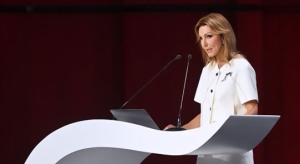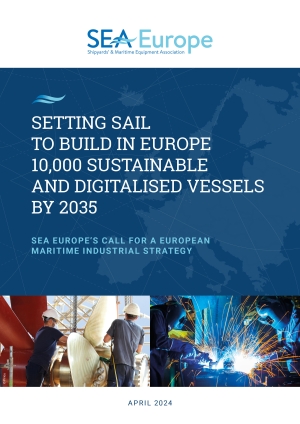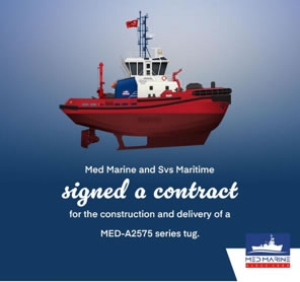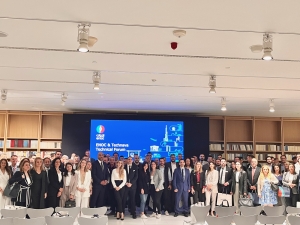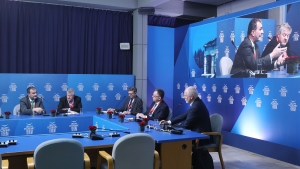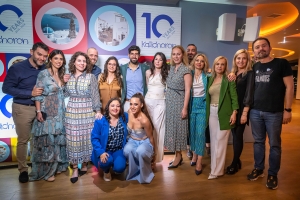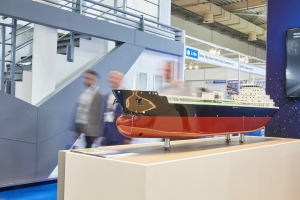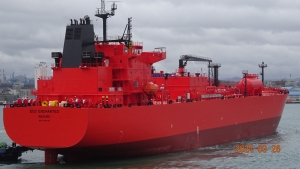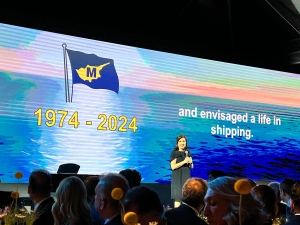- Home
elnavi
Our Ocean Conference 2024 Melina Travlou: "The sea is our home. We honor her and protect her”
The President of the Union of Greek Shipowners Melina Travlou, institutionally representing the world leader in shipping, Greek Shipping, welcomed the start of the work of the "Our Ocean 2024" international conference:
«Welcome to my beautiful country. Welcome to the birthplace of the Ocean.Ο Ωκεανός: according to the myth, the son of Uranus (the sky) and Gaia (the earth). A Greek Titan indeed, who always flows surrounding the Earth.
Today, as we gather in the cradle of maritime civilization, our task is to chart a course for its sustainable future.
We live on a planet, that we call Earth, while it is quite clearly Ocean, as two thirds of it are covered by water.
Sustaining oceans is sustaining life itself.
With this realization, we must join forces to save our oceans.
For a viable future for us all.
In recognition of this common mission, I congratulate the Greek State on embracing this inspired initiative and hosting “Our Ocean”.
Greece’s destiny has been etched by the ebb and flow of the sea.
With a coastline that stretches over 20 thousand kilometers and a tapestry of 6 thousand islands… the sea is our identity.
We, Greeks, breathe, live, and flourish from the sea.
The sea is our bridge to the world.
This legacy has given rise to the largest ocean-going fleet.
Greek shipping is an economic and strategic powerhouse… It boasts a modern and technologically advanced fleet, proof of our commitment to the environment.
We are proud to be leaders in an industry that secures the welfare of humanity. By making global trade possible. By being the most cost-effective mode of transport for essential goods and energy. We maintain the living standards of people worldwide. Shipping is the backbone of the global economy.
The annals of history attest to this instrumental role shipping has played – and is playing - even in the face of unprecedented challenges.
Ladies and Gentlemen,
In shipping, we prioritize safety and environmental stewardship.
We operate under the strict global rules of the International Maritime Organization (IMO). We adhere to its conventions, of which 21 are directly environment-related, and we take pride in the effectiveness of these measures. Our industry is rigorously regulated for the prevention of pollution by oil, chemicals, garbage, sewage, and air emissions.
In facing the climate crisis, our sector’s commitment is unwavering.
It is fair to say that shipping has outperformed most other industrial sectors when it comes to reducing carbon emissions, considering that it is a fossil fuel captive industry.
Shipping is by far the least carbon intensive means of transporting goods.
Despite its expansive reach, the shipping industry's Green-House-Gas footprint on a per capita basis, compares to that of the lowest emitting countries. Bear in mind that shipping carries around 90% of global trade and emits less than 1/15th of the top emitting country.
But even that comparison is misleading.
The essence of shipping transcends the industrial activity of any single country. We serve the needs of 8.1 billion souls. We unite countries, people, the world.
Yet, we are aware of, and we also fully embrace our responsibility.
We firmly support the ambitious targets set by our global regulator, IMO for net zero Green-House-Gas emissions by 2050.
We commit to turn targets into action.
However, shipping is interconnected with many other industries and out-of-sector stakeholders, who determine important parameters of its activity. To achieve this goal, we must all go hand in hand.
As we move from the age of hydrocarbons to the dawn of renewable materials, shipping is poised once more to be a cornerstone in this transformative era.
Shipping is responsive, reliable and resilient.
It will power the engine of progress, in the reshaping of the supply chains. And steer us towards a sustainable future.
Ladies and Gentlemen,
For us in shipping, the ocean is our home.
We honor and protect it.Ocean conservation is our way of thinking and acting.
Greek shipping moves beyond aspirational initiatives.
We are at the forefront of technological developments and innovations.
“Our Ocean Conference” is a great call to showcase our commitments to the environment.
Let us all navigate forward, united with vigilance and vision.
Let our industry be a beacon of common sustainable progress.
Let our legacy to the future generations be an ocean bursting with life».
ELNAVI Newsletter
More Information: ELNAVI,
19, Aristidou str., Piraeus 185 31,
Tel.: +30 210 45.22.100, e-mail: This email address is being protected from spambots. You need JavaScript enabled to view it.
SEA Europe, the association representing the European maritime technology industry, comprising shipyards and maritime equipment manufacturers, has issued a resounding call to action to European policymakers. SEA Europe is urging them to formulate a comprehensive European Maritime Industrial Strategy.
The maritime technology industry is pivotal for Europe's strategic independence. It builds, equips and maintains vessels and platforms crucial for transporting goods, people, and energy, connecting maritime regions, and bolstering the Blue Economy. Furthermore, it provides naval capabilities essential for Europe's defence and security.
Despite its strategic role, the European maritime technology industry has faced considerable challenges over the past years, particularly due to longstanding competition distortions from Asia.
Consequently, Europe has experienced a significant erosion in its merchant and offshore shipbuilding. This decline has not only jeopardized the industrial capacity of European shipyards but also undermined the entire supply chain ecosystem encompassing equipment, systems, and technologies, and harmed naval shipbuilding capabilities.
Because of substantial price differentials of 30% to 40%, combined with advantageous financial incentives – especially offered by Chinese banks –, European shipowners have increasingly opted for Asian shipbuilders. As a result, European shipyards have seen a significant decline in orders. This trend not only poses a substantial economic risk but also undermines Europe's strategic autonomy, particularly amidst current geopolitical tensions.
Christophe Tytgat, Secretary-General of SEA Europe, underscored the urgency of the situation: "It is imperative to regain Europe's shipbuilding capacity by securing orders from shipowners, including European shipowners. The transition towards sustainability and digitalisation within waterborne transport and the Blue Economy is a promising opportunity for Europe to surpass global competitors in quality, efficiency, and safety. Our ambition is clear: by 2035, we aim to supply 10,000 sustainable and digitalised vessels to strategic sectors of the European Blue Economy."
Christophe Tytgat emphasized the critical need for EU policymakers to enact a Maritime Industrial Strategy as a matter of priority for Europe’s strategic autonomy: "We call upon EU policymakers to urgently put in place a Maritime Industrial Strategy to support the business cases of the European maritime technology industry. This strategy should bolster technological leadership, facilitate investments, and nurture a skilled workforce. By strengthening its shipbuilding capacity amidst a challenging global landscape, Europe will enhance its economic security and strategic autonomy in the maritime domain, which is much needed in a context of geopolitical tensions.”
SEA Europe presented its policy recommendations at the European Parliament on April 17th, during an event co-hosted by MEP Catherine Chabaud and MEP Pierre Karleskind.
SEA Europe represents close to 100% of the European shipbuilding industry in 16 nations, encompassing the production, maintenance, repair, and conversion of all types of ships and floating structures, commercial as well as naval, including the full supply chain with the various producers of maritime systems, equipment material, and services. As an NGO observer at the International Maritime Organisation (IMO), CESA represents the shipbuilding industry and its supply chain from EU Member States, Norway, and Turkey.
ELNAVI Newsletter
More Information: ELNAVI,
19, Aristidou str., Piraeus 185 31,
Tel.: +30 210 45.22.100, e-mail: This email address is being protected from spambots. You need JavaScript enabled to view it.
Vernicos Scafi Tugs and Salvage Maritime Co., a Greek Towage and Salvage operator in Greece/East Med/Black Sea/Red Sea, together with its partners in SVS, proceeded to the purchase of a newbuilding tug which is expected to be delivered in Turkey within March 2025, under Greek flag.
MED-A2575 was built by Med Marine in Eregli Shipyard in Turkey, one of the most reputable shipyards in Europe. It belongs to RAmparts 2500-W design series by Robert Allan Ltd. and it is one of the most versatile ASD tug design for ship-handling, coastal towing, general purpose or escort duties. It can deliver more than 80 tons of bollard pull. Its high power and maneuverability making it capable to provide both high quality harbor and deep-sea towage services. The tug is fitted with two Caterpillar/3516E main engines, each developing 2,100 kW at 1,600 rpm and with two Kongsberg/US 255S FP thrusters. It is also equipped with FiFi 1 class fire-fighting system, capable also to provide oil recovery and escort services.
Mr. D. Vernicos, Director of Vernicos Scafi, commented: Following the acquisition of the first newbuilding tug with our Greek partners in SVS Maritime Company, we continue our expansion with the acquisition of a second newbuilding tug, strengthening further the relationship of trust with Med Marine Shipyard, by reaching the three orders in less than a year. Vernicos Scafi follows its investment plan that will further strengthen its position and will certainly add value to the fleet of our joint venture in Med Tugs.
Vernicos Scafi Tugs and Salvage Maritime Co. operates mainly in Piraeus and Thessaloniki area, but is also active in other ports as well (East Med/Black Sea/Red Sea, Patras, Lavrion, Mykonos and Katakolon), with a combined fleet of 49 modern tugs
ELNAVI Newsletter
More Information: ELNAVI,
19, Aristidou str., Piraeus 185 31,
Tel.: +30 210 45.22.100, e-mail: This email address is being protected from spambots. You need JavaScript enabled to view it.
ENOC & TECHNAVA Marine Lubricants Forum
ENOC Marine Lubricants & TECHNAVA held a technical forum on April 10th, at Stavros Niarchos Foundation Cultural Center.
Ahmed Alaa, Sales Manager, ENOC Group, presented the agenda of the seminar which focused on ENOC’s technical presentation and the importance of lubricants for the marine propulsion.
Mr. Alaa said that: “ENOC keeps the flame burning by fueling and drives a better future, developing high quality energy solutions. The company has evolved to a global operator in the energy market across 60 markets diversifying its offering and has achieved sustainable development in the oil and gas industry.
ENOC was established in 1993 in Dubai and is involved in lub blending, supply and trading oil and gas products. It maintains aviation, industrial gas and retail fuels segments. In the sector of marine lubricants has formulated high quality lubricants operating two blending facilities and trading 400+ ports in 35 countries.
ENOC has value added premium lub solutions by offering technical support services, OEM approvals, single formulation, used oil analysis programs, online technical training, detailed lub instructions, surveys, on-site trouble shooting, product recommendations, etc.
ENOC provides extended life solutions, technology that helps optimize performance, reduce maintenance costs and has developed environmentally accepted lubricants.
The products are used for any type of vessels operating in all sea conditions.
Mr. Mohammed Hassan, Technical Support Manager ENOC Group, explained the functions of marine lubs and referred to the lubricants components (base oil additives, etc) and engine requirements.
He also explained the role of the engine oil viscocity which is very important because it reduces the friction and separates the moving parts of the engine.
He said that engines need optimum viscocity and total base No. which neutralizes corrosive acids. In the new era of decarbonization ENOC develops and works on new types of lubricants appropriate for engines that burn alternative fuels.
It must be noted that the New ENOC Marine Lubricants STRATACYL 540II and STRATA SM030 are EAL (Environmental Accepted Lubricants) certified.
Mr. Frank Venter (Senior Development Expert, Tribology Fuels & Lubricants) of WinGD spoke about the importance of lubricants.
He referred to WinGD lubrication & piston running concepts, main engines Marine 2s lubrication systems, oil validation process and guidelines. He explained the Functioning of the TriboSystem and the importance of lub validation.
Mrs. Stella Tomazos, managing director of Technava thanked the speaker for their contribution and refereed to ENOC’s investments strategy and expansion in the field of oil and gas.
In 2013 ENOC entered in marine lubricants following the international quality standards and investing in environmentally friendly lubricants, validated by the major manufacturers of engines like WinGD.
The next aim is the expansion to 500 ports in 32 countries all over the world with timely and reliable deliveries always at competitive prices.
ELNAVI Newsletter
More Information: ELNAVI,
19, Aristidou str., Piraeus 185 31
Tel.: +30 210 45.22.100, e-mail: This email address is being protected from spambots. You need JavaScript enabled to view it.
Shipping warned of increasing risks as governments struggle to contain multiplied threats ‘Areas of concern’ for marine insurers have increased sharply, according to Lloyd’s Market marine head Neil Roberts.
War risk insurers are struggling to calculate exposure at any given moment in certain volatile areas.
‘It’s not the same thing to write war risks in times of peace compared to wartime,’ said Frédéric Denèfle.
MARINE insurance and governments alike are struggling to deal with the sudden deterioration in the geopolitical situation that is putting merchant ships at greater risk than for a generation, according to leading insurance specialists and analysts.
“The significant shift over the past two to three years is that for the first time we have a range of actors around the world whose strategic interests are served by trying to interrupt or by targeting commercial maritime traffic,” said Dominick Donald, director at Autolycus Advisory, the UK-based geopolitical risk adviser and analyst.
There were several areas around the world where “weapons of war are being used against commercial maritime traffic to try to stop that traffic plying its normal business,” Donald told an audience at the 2024 Delphi Economic Forum, held in Greece.
“The reality is that, unless those threats are reduced, traffic will be affected and that will have ripple effects across economies, other sectors and markets,” he said. Areas “of particular concern at the moment” included the Black Sea, the Red Sea, “a perennial Iranian threat” to close the Strait of Hormuz as well as unease in East China and the South China Sea, he said.
“If a state or, in the case of the Houthis, a sub-state actor has a strategic interest in interrupting or attacking commercial maritime traffic then they will go further and for longer in pursuing those objectives than would otherwise be the case.”
But Donald underlined that the geographical situation could alter rapidly, and not necessarily for the better.
“Three years ago nobody was worried about the Black Sea,” he said. “Now everyone is.”
“There are going to be other areas of the world where local actors for the moment have no strategic interest in attacking commercial marine traffic, but that calculus may change.”
According to Donald, governments generally “do not have a very good grip” on how the shipping business functions and hence struggled to respond successfully.
“I found this to my great surprise when the Somali piracy explosion happened in 2008 and I’m not sure the situation has improved very much since then,” he said. One of the difficulties was that the commercial maritime world was dynamic and continually changing.
When a government tries to understand something that it doesn’t understand, it gets a snapshot and thinks that the email it got setting out situation A two years ago still applies. But by that time we have got to situation Z and they do not understand what’s going on and so they have to begin the whole re-education process again and again.”
With current wars, crises, sanctions and big strategic issues such as the energy transition to grasp, governments found themselves “almost always behind the curve.”
The need for states to fashion a more effective response to what is a deteriorating climate for the protection of shipping was also addressed by Neil Roberts, head of Marine & Aviation, Lloyd’s Market, and a member of the International Union of Marine Insurance Policy Forum.
The number of “areas of concern” for insurers, where they require notification from shipowners if vessels are trading there, had risen from 15 or 16 a decade and a half ago to 24 today, he said.
“We are confronted by a range of threats,” said Roberts. “Our supply chains are based on a peacetime scenario and calculated on the best economics. That’s outdated when you’ve got threats all around. “Shipping is a facilitator for international trade and insurance sits behind the shipping. You take either of those out and there is a risk of serious disruption,” he warned. Roberts acknowledged that as the risks facing shipping rise, insurance capacity may shrink.
Already, reinsurers had balked at involving themselves in the Russian-Ukraine conflict, leaving the direct market “on its own” with a resulting reduction in capacity.
Of a possible strain on capacity because of threats against shipping, Roberts said: “You can see it coming. Nonetheless there will be people willing to provide the cover, it will just be more expensive.”
On the appearance of actors ready to disrupt maritime commerce, he said that there were nations who were “pushing the legal envelope in a grey zone and they are not being stopped, so they push a little further.
“This is a live situation that’s still going on and it doesn’t look like internationally we are dealing with it very well.
“We have a just-in-time economy suited to a peacetime situation which has now become unstable while we need a just-in-case economy and we need infrastructure to support that. It’s quite concerning overall,” he said.
A proliferation of sanctions was adding to the problems, Roberts said. “When I started, the compliance team in my company was two people — we kept them in a cupboard and they never came out except at Christmas. Now it’s two floors and they tell you what you can’t do.
“It’s a complete change and it’s certainly gumming up commercial trade,” he said. “It’s on the cusp of paralysing commercial trade. “It’s an absolute problem for us as insurers cannot enforce. For actual enforcement you are relying on the states. They have to do something other than push it into the financial area and hope for the best,” he said.
Frédéric Denèfle, president of the International Union of Marine Insurance, France, said that while there had been threats to navigation in past decades, today’s geographical spread of threats and the sensitivity of an interdependent world economy “probably” made current events unprecedented.
According to Denèfle, who is also managing director of Paris-based war risks specialist Garex, actual hostilities against ships have come as “a shock” to the marine war risks market.
“It’s not the same thing to write war risks in times of peace compared to wartime,” he told the audience. “We have been insuring war risks for decades without any serious events, or at least not of this magnitude.”
Some reinsurers that were backing the direct market had already taken the position that “the situation was quite difficult to handle,” he said.
A major issue was being able to track the vessel insured against war risks and ensuring that too much exposure did not accumulate. “The truth is that we are not 100% sure of the number of ships we insure in some areas,” said Denèfle. “For example we do not exactly know how many vessels are trading nowadays between China and Taiwan. That’s a big question mark. That’s a data collection problem and we have to try to clarify this.
“We need partnership, not just with technological suppliers but also with governments when it comes to war risks.
“What we can try to do to match this situation is to enlarge the capacities and mutualise the capacities for covering war risks in a better way,” he commented.
“Instead of relying on reinsurance we would have to work together and cooperate more to expand the securities that are available for the benefit of the shipowner.”
Denèfle alluded to historical cases when governments had stepped up to act as insurers of last resort in order to protect national assets and trade. “We are also considering for those very extreme situations some form of private-public partnership to secure that kind of risk and to provide coverage when it is otherwise impossible.
“We are not there yet, but it is something to have in mind,” he said.
“As hull underwriters, we see a lot of types of risks,” said Ilias Tsakiris, chair of IUMI’s Ocean Hull committee.
“War has seriously affected the supply chain. It has showed us that in times of peace, all systems work perfectly but all of a sudden our trade routes are not safe anymore, which means our supply chains have to change.
“When we change the trade routes it automatically increases the risks because it’s an unknown,” said Tsakiris, who is also chief executive of Hellenic Hull Management. “The trade route becomes longer, increasing wear and tear on the asset, through more remote areas where salvage may not be readily available. If salvage is not readily available that increases strain on crew. When you have strained crew it increases the risk of accidents on board.
“All these may not be new risks but they are enhanced risks,” he said.
ELNAVI Newsletter
More Information: ELNAVI,
19, Aristidou str., Piraeus 185 31,
Tel.: +30 210 45.22.100, e-mail: This email address is being protected from spambots. You need JavaScript enabled to view it.
LALIZAS acquired Revere Survival, a US-based manufacturer & distributor of liferafts and other premium survival equipment for the recreational and commercial markets; a move that marks a significant milestone in the company’s journey towards continued growth and expansion.
#thelalizasforce has already developed a strong presence in the US market since 2018 with the acquisition of LALIZAS/ALEXANDER in Houston, TX & Houma, LA (former Alexander/Ryan Marine & Safety).
In the frame of wisely seizing opportunities for growth, LALIZAS made one more strategic acquisition in order to expand its offerings on the continent of North America.
The acquisition of Revere Survival in Jacksonville, FL will allow LALIZAS to enhance its presence in the US market, leveraging the resources and expertise gained from the acquired entity. The overall communication between Alliance Marine (the former owner of Revere) and LALIZAS was exemplary during the transition period, making things move swiftly and smoothly. Their decision to depart with Revere was simply based on their focus, which is the European Market.
Jeremy Tedguy, President of Alliance Marine Group: “Alliance Marine strategy is focused on the European market with the ambition to be the primary platform for B2B & B2C distribution of parts and equipment serving both recreational boating and professional marine industries. For this reason, we are glad to see Revere joining Lalizas to continue expanding in the US market. Revere did a fantastic job, delivering a +50% growth since 2018. We thank all the team for their professionalism and strong partnership with Ocean Safety.”
Alistair Hackett, Managing Director of Ocean Safety: “We have had a fantastic working relationship with Revere Survival, working together to develop product synergies and sales across the USA. This divestment has no consequence on the servicing of our products in the US, in particular for Ocean Safety liferafts for which the current service station network will be continuously supported. To Revere’s team and Lalizas, we wish them ‘all the best’ for the future.”
“The acquisition of Revere aligns perfectly with our strategic vision and will enable us to enhance our product offerings, expand our market reach, and strengthen our position in the US market. As we move forward with the integration process, our top priority remains ensuring a seamless transition for our employees, suppliers and customers. We are committed to exploring synergies and maintaining the high standards of quality and service that our companies are known for, while also exploring new ways to drive success,” commented Stavros Lalizas, Founder & CEO of LALIZAS.
For every new acquisition made, there is an “acquisition and implementation team” formed under the leadership of Mr. Lalizas himself, which takes care of the integration process making the new business part of LALIZAS, and has the task of finding any synergies between the new business unit and the current activities of the company.
LALIZAS was founded by Mr. Stavros Lalizas on 1982, and still proudly preserves the character of a family-owned business, which continuously grows. In the past, LALIZAS has proven to be able to turn companies that acquires into even more successful and profitable businesses.
For us, Safety is not just a product, it is an ongoing process!
About LALIZAS: LALIZAS is a family owned company, whose vision is to produce high quality products that ensure safety at sea, and distribute them in international markets through its well‐established distribution network. It was founded in Piraeus, Greece, in 1982. Its product range includes lifejackets (foam-filled and inflatable) ISO and SOLAS meeting all regulations under any flag, life rafts, MOB devices and navigation lights, immersion suits, safety harnesses, IMO signs and many other marine products. All items are being manufactured and distributed in competitive prices to maritime companies, ship suppliers, chandleries, marine stores, shipyards and boat builders around the world always taking into consideration the market’s feedback. Τhe genuine care for their customers and the indispensable input of their employees, who are considered as #thelalizasforce, has resulted in the company's growth and will continue to contribute positively to the continuous development of LALIZAS.
For LALIZAS ‘Safety is not just a product, it is an ongoing process!’
https://www.lalizas.com/
About Revere Survival: Revere Survival manufactures and distributes a premium range of safety and survival equipment, including leisure and USCG commercial liferafts and IBAs, inflatable PFDs, rescue beacons and pyrotechnics. Their products are ISO, SOLAS or USCG certified for both the pleasure boating and professional markets.
ELNAVI Newsletter
More Information: ELNAVI,
19, Aristidou str., Piraeus 185 31,
Tel.: +30 210 45.22.100, e-mail: This email address is being protected from spambots. You need JavaScript enabled to view it.
Kallichoron Art Boutique Hotel hosted a 10th anniversary celebration event of continued business.
Reflecting on 10 years of elevated hospitality, Maria Mavroudi, co-Founder of Kallichoron, said “I take great pride in our accomplishments over the last decade, and I want to thank everyone who has accompanied and contributed on our journey thus far – our dedicated and talented people, our guests, and especially our business partners and associates. As we celebrate this important milestone, I am even more inspired about our personalized service, our innovative approach to guest satisfaction and our commitment to sustainable practices; it is more crucial than ever to work for a more sustainable tomorrow.”
Over the past decade, Kallichoron has been dedicated to offering guests a high-end, personalised experience; pairing art, luxury amenities, and the incomparable Greek hospitality together.
Since its inception, Kallichoron has attracted guests seeking a haven for their travels than simply a place to rest. With its curated art collection, eco-friendly practice, and personalized service, the hotel has become a beloved destination for art enthusiasts and eco-conscious travelers alike.
"Our journey over the past 10 years has been nothing short of extraordinary," said Carolina Alkalai, co-Founder of Kallichoron Art Boutique Hotel. "We are incredibly grateful to our guests, staff, and partners who have supported us throughout this journey. This milestone is a testament to our commitment to excellence and our passion for creating memorable experiences. A joyful reminder to continue the hard work, alongside our valued business partners and our team, to carry on improving the tourist product and innovative services we provide, by the love and passion for what we do, and the inspiration Astypalea Island itself gives."
To commemorate this special occasion, Kallichoron Art Boutique Hotel hosted a cocktail party in the early evening of 14 April, 2024, on the impressive Ploes Floating Venue. A most glamorous night in Athens, where the hotel’s business partners, associates and repeat guests, had the pleasure of celebrating the ten years of the hotel’s successful service.
And Kallichoron’s celebrations don’t end here. The team has planned a series of events and special promotions which will run throughout their anniversary year. Guests can look forward to art exhibitions, culinary courses, and special offers that showcase the hotel's unique offerings.
As Kallichoron Art Boutique Hotel marks a decade of service, it remains steadfast in its mission to provide guests unparalleled hospitality, inspired art experiences, and a sustainable approach to luxury travel for the years to come.
A few words about Kallichoron Art Boutique Hotel
Kallichoron is an eco-labelled Art Boutique Hotel that offers breathtaking views of the island’s landscape, including the majestic Venetian castle, the famous old white windmills and the boundless Aegean Sea. Kallichoron’s ideal location, in combination with the premium service, the luxury amenities and the sweeping views, create a serene and stylish environment and ensure a memorable stay on the island of Astypalea. Moreover, its services include a premium concierge service, spa treatments, art shop, business corner, and lending library. It is a certified Bike-Friendly, a Pet-Friendly and a Green Key eco-labelled hotel.
Greek Breakfast plays an integral part of Kallichoron's offering. Guests are delighted with the homemade, award-winning "Grandma's Breakfast", curated by a dietician-nutritionist and served at their room free of charge. Notably, Kallichoron is the only hotel in Greece that has been awarded the Green Marketing Excellence Award for its breakfast service.
In 2022, in cooperation with the renowned Greek Chef Alexandros Papandreou, Kallichoron's breakfast delivery service was introduced.
Being a socially-responsible hotel, Kallichoron allocates funds from each reservation and through its "Room2Give" CSR initiative, actively supporting local community projects for children and young adults where possible. All these actions reflect Kallichoron’s commitment to run sustainably and offer high quality services to its guests.
ELNAVI Newsletter
More Information: ELNAVI,
19, Aristidou str., Piraeus 185 31,
Tel.: +30 210 45.22.100, e-mail: This email address is being protected from spambots. You need JavaScript enabled to view it.
Over 85 shipyards from 26 countries already confirmed to showcase vessel design and production innovations from June 3-7
Greece’s revitalised shipbuilding industry will be prominently represented during Posidonia 2024, signalling a strong recovery following decades of decline and disrepair. The sector’s Greek renaissance is on the cards after the completion of the consolidation of the country’s shipbuilding units in Syros and in Elefsina, and also due to the restart of Skaramangas shipyard and the increased activity in Halkida.
Neorion Shipyard in Syros and Elefsis Shipyard have repaired over 500 ships, foreign and Greek-owned, since the New York-based ONEX Shipyards and Technologies group took over their operations in 2019. Combined with further domestic output from other ship repair and shipbuilding operations, Greece is now seen as an important contributor to European shipyards’ annual production value of around €43 billion, which comprises a collective civil and naval orderbook value that surpasses that of their Asian counterparts.
"Greece is resurfacing as a credible shipbuilding cluster for vessel repair, conversion and potentially for the construction of newbuildings for Greek and international shipowners and naval forces. This revival follows decades of underperformance and underinvestment, marked by the absence of a strategic vision," said Theodore Vokos, Managing Director, Posidonia Exhibitions S.A., the organiser of the world’s most prestigious shipping exhibition.
Through a slate of strategic partnerships and multimillion investments, Greek shipyard operators and the Greek government are making a statement of their long-term commitment to a sector estimated to currently account for 1% of the nation’s GDP. The sector’s revival will further strengthen both the country’s economy and security. Partnerships will amongst others include naval projects, as the Greek government discusses with the US the joint design and co-production of the new generation of Constellation frigates, while increased activity in the shipyards will empower and support Greek maritime equipment manufacturers, further enhancing Greece’s contribution to Europe’s 50% market share and global dominance in marine equipment manufacture and supply.
Ahead of Skaramangas Shipyards’ comeback to the Posidonia Exhibition, recently appointed Chairman Miltiadis Varvitsiotis has stated his lofty ambitions to transform the facility into a multi-million contract-winning operation capable of capturing a share of the action. He said: “Since 2010, the shipyard was exclusively involved in the repair, maintenance, and upgrade of the Hellenic Navy’s fleet. Now, with new ownership and management, we are ready to present our world-class infrastructure and state-of-the-art equipment for heavy and specialised repairs. We are going to promote our future plans and explore the possibilities of undertaking important and sophisticated new building projects.”
The company intends to make full use of the existing infrastructure comprising some of the largest drydocks in the Mediterranean, capable of drydocking VLCC, LNG carriers and aircraft carriers. Skaramangas has been investing in the gradual upgrading of facilities, strengthening fire safety and firefighting systems, and re-operating a large tank that has been inactive for about 20 years.
In general, Greek shipyards are investing in areas designed to improve their competitiveness and attractiveness, mainly to Greek shipowners who currently contribute 80% of Greek ship repair and new build activity. The ONEX group's business plan includes investments worth $550m for the shipyards with the goal of boosting repair operations to 300 vessels per year. Panos Xenokostas, President & CEO, ONEX, said: “Our goal is to transform the historic shipyards into a modern maritime hub for the greater Mediterranean region. We aspire for both Elefsis and Syros Shipyards to become the first choice of those seeking quality, speed, and personalised service, while adhering to relevant security protocols and always taking into consideration the transition to a sustainable maritime model.”
ONEX aims to transform its shipyards into a hub supporting commercial shipping horizontally, energy transition, defense platforms, and industrial solutions, leading the entire industrial ecosystem of the region and strengthening both the economy and the geopolitical position of Greece.
At the same time, Chalkis Shipyard is investing in the installation of photovoltaic systems to power shipyard needs and those of vessels either berthed or docked at its facilities and is proceeding with infrastructure works for newbuilding capabilities of specialised vessels up to 100m in length. Its goal is to expand operational capabilities to about 240 vessels annually, serve ships of larger capacity, and build small ships with new technology. “In addition, we have trained our personnel and keep investing in a skilled workforce who can install green energy systems like scrubbers and new technology propulsion systems on vessels. In the last years we have completed the installation of scrubbers in a number of vessels,” said Ashraf Bayoumi, CEO, Chalkis Shipyards, which is preparing for its eight Posidonia Exhibition participation.
Furthermore, private and institutional investors are seeing the opportunity presented by Greece’s geographic location, maritime heritage, commitment of the Greek ship owning community, and political will to fund the sector. The recent acquisition of Skaramangas’ by shipowner George Prokopiou and the US International Development Finance Corporation’s $125m loan to Elefsis Shipyards and Industries (ONEX) demonstrate strong investor interest in the Greek shipbuilding sector.
As advancements in maritime technologies gather pace, Greek shipyards have an opportunity to adopt and seamlessly integrate new Artificial Intelligence, Green Energy and Automation Innovations across their operational capabilities to introduce efficiencies, further improve productivity, enhance appeal, and strengthen their orderbooks.
Chalkis Shipyards is already applying new technologies and using digitalisation in programmes related to design for repairs, new constructions, and Customer Relations Management (CRM) platforms. It is implementing 3D model programmes with the relevant equipment in which it is investing, while seeking new ways to introduce AI across the business to optimise operations and automate tasks.
Skaramangas is involved in emission-reducing technologies and scrubber installation, while exploring potential synergies for the development of new ship designs incorporating the new generation of green fuels.
“A strong shipbuilding sector creates the conditions for upgrading national defence, contributes decisively to the national economy and the green transition and strengthens Greece's position in the regional geopolitical arena through the implementation of major projects with international significance,” said Xenokostas.
Over 85 shipyards from 26 countries have already confirmed their participation in Posidonia 2024, which will take place from June 3-7 at the Athens Metropolitan Expo.
Posidonia 2024 is organised under the auspices of the Ministry of Maritime Affairs & Insular Policy, the Hellenic Chamber of Shipping, and the Union of Greek Shipowners, and with the support of the Municipality of Piraeus and the Greek Shipping Co-operation Committee.
ELNAVI Newsletter
More Information: ELNAVI,
19, Aristidou str., Piraeus 185 31,
Tel.: +30 210 45.22.100, e-mail: This email address is being protected from spambots. You need JavaScript enabled to view it.
Vafias Group’s three listed companies recorded excellent profits for 2023 and the group expands to dry cargo sector
With total Revenues $360m, total assets $1.2bn και total profits $135m the three listed companies of Vafias Group, StealthGas, Imperial Petroleum & 3Cis recorded a dynamic activity during 2023.
Also, the group unstoppable continues with the purchases of dry cargo vessels and announces 2 more supramaxes purchased last month, the “AULAC VANGUARD” and the “AMIRA MIRO”, both of Japanese construction built in 2012.
In the last year, the group has bought 17 dry cargo ships and in particular eight capes, two kamsarmax, three handies and four supramax.
The most impressive fact is that all vessels are Japanese-built as the group has left China since 2010 when it built four aframaxes at New Times and one capesize at SWS.
Also, it must be reminded that of the five shipping companies in the group, four are without bank loans, while StealthGas has only 15% debt.
The group still has two newbuildings 11,000cbm VCM carriers each to take delivery from Japan in 2025 and 2026. While it has just taken delivery of the last of five 40,000cbm Ammonia carriers from Hyundai in Korea named “ECO ENCHANTED”.
Also, Vafias group supports the effort to revive the Greek shipbuilding industry and announces that it has already done more than twenty ship dockings in Chalkida and another three at ONEX in Syros.
After the last purchases the total tonnage of the group approaches 6m dwt.
ELNAVI Newsletter
More Information: ELNAVI,
19, Aristidou str., Piraeus 185 31,
Tel.: +30 210 45.22.100, e-mail: This email address is being protected from spambots. You need JavaScript enabled to view it.
50 Years of TRANSMED SHIPPING The shipping company that sailed Cyprus flag all over the world
Following the traditional values and principles of Greek shipping, Cypriot shipowner Charalambos Mylonas, with the undivided support of his wife Chariklia, marked a creative and respectable 50-year course in the field of shipping which is today continued successfully by the next generation of Mylonas family.
This important anniversary was recently celebrated at the offices of the Transmed Shipping company in Ekali in the Northern Suburbs of Athens.
The hosts of the touching event Katerina and Nicole Mylonas, daughters of the founder, welcomed with great pride the distinguished guests who had the opportunity to watch an impressive video with the story of the charismatic and dynamic personality of Charalambos Mylonas and his wife who started from scratch building a remarkable shipping group.
The guests, friends and associates also received a luxurious album with the 50-year journey of Transmed, the founder and his wife.
It should be noted that the album was published by ELNAVI under the diligence of co-publisher Theano Kalapotharakou and the collaboration of the graphic designer Maria Kardamenis.
The event was honored by the Bishop Nikolaos of Mesogaia, Father Alexios, the Deputy Minister of Shipping of Cyprus Mrs. Marina Hadjimanolis, the ship owners George Prokopiou and Thanasis Martinos, Panos Laskaridis,
Andreas Hatzigiannis, Dimitris Prokopiou, Nikolaos Vafias, Evangelos Angelakos, Haralambos Fafalios, representatives of registries, class societies, friends, associates, company employees, well known shipowners and shipping personalities.
As Katerina & Nicole Mylonas mentioned in their speeches: “Our parents started their careers as lawyers in the city of Famagusta in 1970 representing the interests of Greek shipping companies and mainly the Martinos family shipping operations. In 1974, after the Turkish invasion of Cyprus, they moved as refugees to Greece, where with the help of many friends from the shipping industry started their own maritime adventure building a credible and well established shipping group that is involved mainly in the field of dry cargo and oil transport.
Excited Charalambos Mylonas in his message to the friends of the company emphasized that: "The road of shipping is not easy. We fought it with courage and determination. I declare that with any means I will not retire being present in the next 50 years of Transmed".
He thanked his wife Hariklia, his daughters Katerina and Nicole, his son-in-law Ilias Angelakos who all have successfully taken over the reins of the business.
He also thanked all the friends and associates who welcomed them in Greece working hard for 50 years with understanding and mutual benefit.
Extensive reference was made to the contribution of Charalambos Mylonas as president of the Cypriot Shipowners' Union where in 1981 a collective agreement was signed with ITF implemented on Cypriot-flagged ships.
Other emblematic milestones of Transmed were the company’s certification with the ISM Code, the first orders of newbuilding vessels in 1996 and the social contribution of Mylonas family which includes the establishment of the Palliative Care Centre "GALILEE" in the area of responsibility of the Holy Metropolis of Mesogaia and Lavreotiki for terminally III cancer and ALS patients, and the construction and restoration of churches in Kastellorizo, Agathonisi and Jerusalem in the Holy Sepulcher.
Looking forward, Transmed will continue to make its way through calm and choppy seas, always guided by its legacy of perseverance, innovation and strive for excellence.
ELNAVI Newsletter
More Information: ELNAVI,
19, Aristidou str., Piraeus 185 31,
Tel.: +30 210 45.22.100, e-mail: This email address is being protected from spambots. You need JavaScript enabled to view it.




